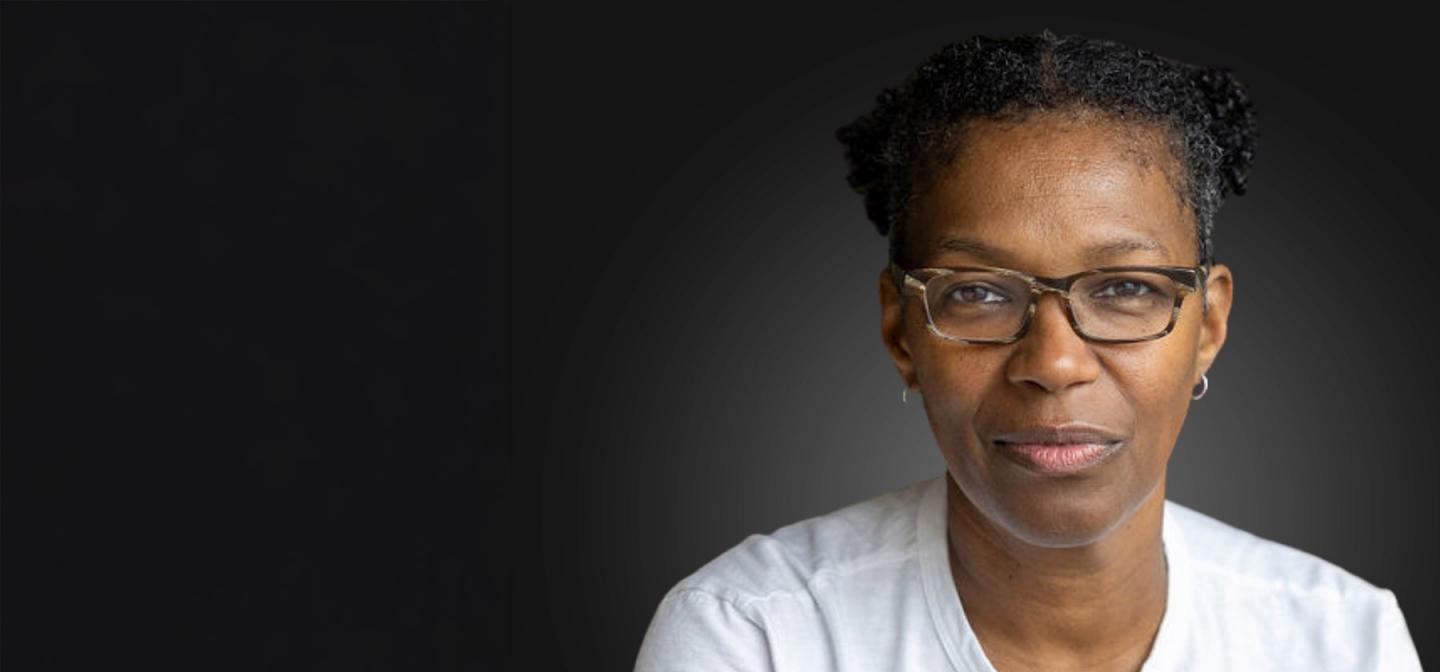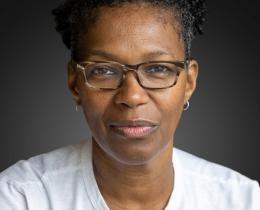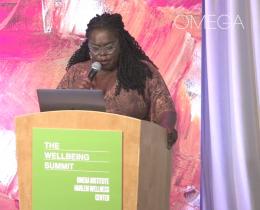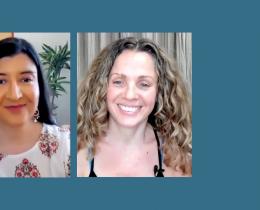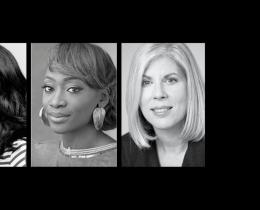Omega: How do you see self-care as a particularly radical act of freedom and healing? How can meeting our individual needs bring us closer to being able to meet the needs of the many?
angel: My colleague and dear friend Kerri Kelly and I talk about the difference between wellness and well-being. Well-being is about being well. It’s about having access to the resources to self-determine the unfolding of our lives because we’re not going to all do it the same way and we don’t need to. Self-care puts us in touch with a personal gauge of well-being.
When we commit to acts of self-care, first we open up a channel of communication with our nervous system, current and past and future. We open up a channel with all three worlds of our self that says, "You matter. You matter enough for me to tend to you—the you that wasn’t tended to once upon a time, the you that feels overwhelmed right now, and the you that fears going out and taking a step, overwhelmed and not sure about how it’s all going to turn out."
Then our nervous system can relax about this feeling of disconnect and we begin to communicate with ourselves. It’s amazing because then the projections that we carry—projections such as “they must not think I matter”—start to quiet. Going back to stillness, those projections and the ways we are not caring for ourselves get reeled in. When we start caring for ourselves, we are better able to perceive clearly: "I think you’re not looking at me because you don’t think I matter, when actually, you’re not looking at me because you’re experiencing your own pain and you’re trapped in that. So how can I help?"
So self-care is hardcore. And you’re talking to somebody who took a long time to catch that and nearly had to kill myself to really get it. I did that "market-place" self-care. Real self-care is being responsive to this organism as a living, breathing, generative thing that feels and wants and is made happy by little things. That’s what we all need. When we get that sense of touch from our own self it can paradoxically relax that need and grasping.
Omega: Audre Lorde wrote, “Your silence will not protect you.” But silence is a deep practice of Buddhism. How do you know when quiet reflection is called for, and when bold, active engagement is appropriate?
angel: Too much attention has been placed in Western Buddhism on a notion of silence that suggests not having a voice. Our action expresses our voice and the voice of our heart. That’s what action is—the voice of the heart speaking. Sometimes it speaks softly and sometimes loudly. I think of silence more as when we are simply receptive to what is and to allow what is to unfold in front of us.
So when is it that we respond with bold action? The interesting paradox is that stillness provides the path forward, so there’s not so much a choice made, but rather a following of where stillness leads us.
When you allow yourself to become still, you can feel yourself finally. You feel the environment around you but don’t conflate reactions of the nervous system, emotions running, and the habitual patterns of anxiety or aversion with who you are fundamentally—a human being that is intimately interconnected with all other life. You are not part of life, you are life itself—simply one expression of one thing, distinct and different, but one expression of that same one thing.
Stillness taps us into the ability to feel the wholeness of our intimate connection to all that is. In that stillness, re-tapped into the whole organism rather than this little subjective me, me, me thing, I get the message that this whole organism is just taking it all in right now. That to simply be there and be present is the most powerful way that I can speak. At other times I feel the stir of something to do. It’s not so much a head decision as it is a belly decision, right down in your belly that says, "Move."
Of course, the mind becomes integrated into strategy and decision making. But the impetus to act comes right out of the stillness. They’re not contrary to one another. And it’s not silence as in "no voice." It’s a dynamic stillness that allows the noise to be separated from the voice of our own heart.
Omega: You grew up with Christianity, which speaks a lot to sacrifice and martyrdom—especially in African American communities—and now practice Buddhism, which teaches transformation of suffering into wisdom, detachment, and compassion. How do you re-frame “struggle”?
angel: I just had a bit of this conversation with Lama Rod Owens. We were on the train and I said, “You know I’ve released the use of the word struggle.” I said, “I don’t know what the proper term is for it, but linguistically there is no natural end to the word struggle: un-struggle, de-struggle. When do you stop?”
So I think of it as working with something. That’s what Buddhism does. It may sound like a little turn of phrase but it makes a world of difference. So first, I’m working with it. I’m not struggling against it. Struggle feels like—this thing is consuming me. That it’s me against you, one of us is going to win and one is going to lose. I didn’t really care for that experience of incessant unmitigated struggle.
Buddhism has this notion of transmuting suffering. Chögyam Trungpa Rinpoche (founder of Shambhala Buddhist tradition) talks about working with the material. It’s like manure. You don’t go and struggle with the manure. You work with it as fertilizer. It goes through an alchemical process by you being willing to actually receive it. From “for or against” to “being with." It’s a receptive relationship—which is not to say that we ask for it. It is to say that we receive it as it comes.
That’s so relaxing—you don’t have to be for or against. Which is basically how we operate in all of our lives. We’ve got to move around in the world, and we see people. We’re sussing them out—am I for you or against you? Are you with me or against me? We’re doing that comparing all the time. But what if you just are me?
So whatever you bring I'm going to work with it, because you are me. You’re there. You’re just what is so. Today you bring a funky attitude, and I’m working with that. But I’m working with it from a relaxed place because I don’t have any immediate sense of getting rid of you, destroying you, competing with you, or running away from you. There’s a basic ground of ease that comes from holding an overall view: everything that arises is yours to work with. It isn’t this place of opposition and partitioning and division that our society thrives on.
I think that black folks bring their own interpretation to the Christian tradition. And of course at its core, like all of the great religions, it’s rooted in love. But the modern expression is riddled with the same illnesses that plague Western society—the aspects of it that have been lifted up foster division, opposition, and an orientation of conquer or be conquered.
And just in case you’re part of the peoples that need to be conquered, we have a little clause that is martyrdom and you’ll be rewarded in the next life for your sacrifice. So we mollify the people that dare to resist being conquered—when we rape your women, take your land, remove you from your home, and name you a color rather than a place—by saying you’ll be rewarded in heaven where there are no property or women to be concerned about or for us to acquire.
It's challenging, it’s a very complicated relationship to religion. It’s the power of having uprooted a people. Because we don’t have a sense of our own anymore—it’s like being in a place where all your clothes are borrowed. You’ve got to do the best you can, but nothing quite fits. And that setup was utterly intentional and systematic, it wasn’t an accident.
We can’t roll back the past, but we can certainly stop trying to do everything in our power to keep it going or get on board with it. You can’t just lament over it. We have a strange sense that if we acknowledge the depth and feel the pain, we’ll just be crushed and overwhelmed. It’s not true. It’s a very profound paradox that I got out of sitting with it—a real commitment to fully express myself and make myself available to the liberation of not just “my people,” but all people. Precisely because I have some beginning sense of what it means to have been so uprooted and forcibly disconnected.
